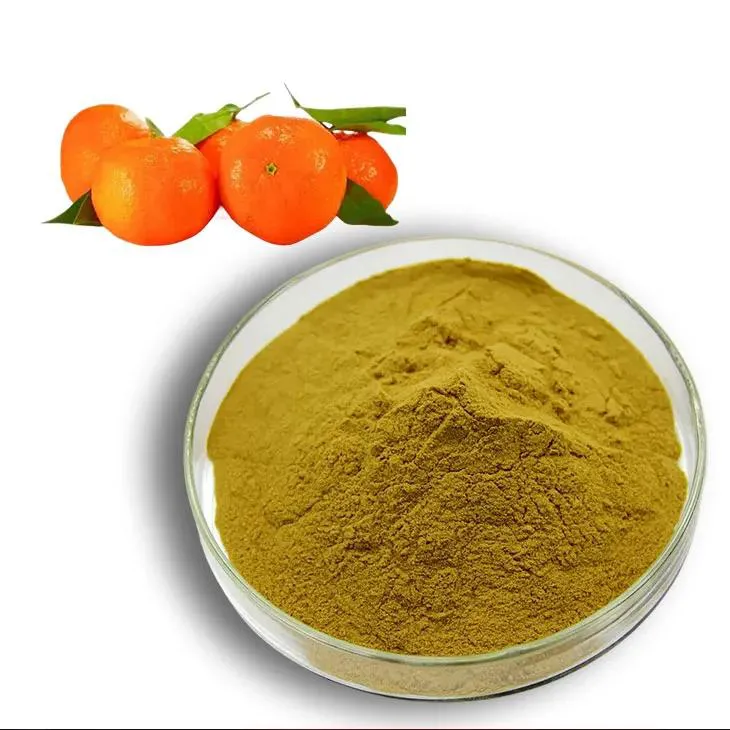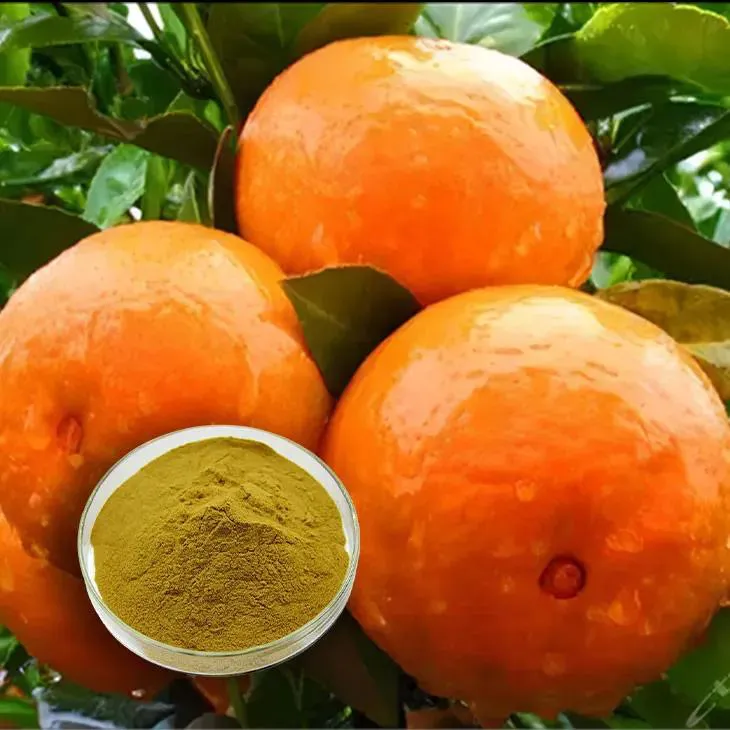- 0086-571-85302990
- sales@greenskybio.com
Citrus Bioflavonoids: Are the Extracts Effective for Weight Loss?
2024-11-12

1. Introduction
In recent years, the pursuit of effective weight - loss strategies has led to an exploration of various natural compounds. Citrus bioflavonoids have emerged as a potential candidate in this regard. These compounds are widely present in citrus fruits such as oranges, lemons, and grapefruits. They are known for their diverse biological activities, but their relationship with weight loss remains a topic of great interest.
The idea that citrus bioflavonoids could play a role in weight management is not unfounded. Given their antioxidant properties and potential influence on physiological processes related to metabolism and hormonal balance, it is crucial to examine whether their extracts can truly contribute to achieving weight - loss goals. This article will conduct a comprehensive review of relevant studies to shed light on this matter.

2. What are Citrus Bioflavonoids?
Citrus bioflavonoids are a group of polyphenolic compounds that are naturally found in the peels, pulp, and seeds of citrus fruits. They are secondary metabolites of plants and are responsible for many of the health - promoting properties associated with citrus consumption.
There are several types of citrus bioflavonoids, including Hesperidin, naringin, and Quercetin. Hesperidin is particularly abundant in oranges and has been the subject of numerous research studies. It is known to have antioxidant, anti - inflammatory, and vascular - protective effects. Naringin, found mainly in grapefruits, has also shown potential health benefits, such as improving lipid metabolism. Quercetin, which is present in various citrus fruits as well as other plant sources, is a powerful antioxidant with anti - carcinogenic and anti - inflammatory properties.

3. Biological Activities of Citrus Bioflavonoids
3.1 Antioxidant Effects
One of the most well - known biological activities of citrus bioflavonoids is their antioxidant effect. Oxidative stress is associated with many chronic diseases, including obesity. Free radicals produced during normal metabolism can damage cells and tissues, and this oxidative damage may play a role in the development of obesity - related metabolic disorders.
Citrus bioflavonoids act as antioxidants by scavenging free radicals and preventing oxidative damage. They can neutralize reactive oxygen species (ROS) and reactive nitrogen species (RNS), which are involved in various pathological processes. For example, Hesperidin has been shown to reduce oxidative stress markers in animal models of obesity, indicating its potential role in protecting against obesity - related oxidative damage.
3.2 Effects on Hormonal Balance
Hormonal balance is crucial for weight management. Several hormones, such as insulin, leptin, and adiponectin, play important roles in regulating appetite, metabolism, and fat storage. Citrus bioflavonoids may influence hormonal balance in different ways.
For instance, some studies suggest that citrus bioflavonoids can improve insulin sensitivity. Insulin is a key hormone in glucose metabolism. When insulin sensitivity is impaired, as in type 2 diabetes and obesity, blood glucose levels can become elevated, leading to increased fat storage. By enhancing insulin sensitivity, citrus bioflavonoids may help regulate blood glucose levels and potentially reduce fat accumulation.
Additionally, citrus bioflavonoids may also affect the levels of leptin and adiponectin. Leptin is a hormone produced by adipose tissue that signals satiety to the brain. In obese individuals, there is often a phenomenon known as "leptin resistance," where the brain does not respond properly to leptin signals, leading to increased appetite. Some research indicates that citrus bioflavonoids may help improve leptin sensitivity, thereby reducing appetite. Adiponectin is another important hormone that is inversely related to body fat percentage. Higher levels of adiponectin are associated with better metabolic health. Citrus bioflavonoids may increase adiponectin levels, which could contribute to improved metabolic function and weight loss.

4. Citrus Bioflavonoids and Weight Loss: Evidence from Studies
4.1 Animal Studies
Animal studies have provided some evidence for the potential role of citrus bioflavonoids in weight loss. In rodent models of obesity, supplementation with citrus bioflavonoids, such as hesperidin, has been shown to reduce body weight gain. For example, one study found that mice fed a high - fat diet supplemented with hesperidin had lower body weights and less adipose tissue accumulation compared to those fed a high - fat diet alone.
These effects may be attributed to the various biological activities of citrus bioflavonoids. The antioxidant effects may protect against oxidative damage in adipose tissue and other organs, while the influence on hormonal balance may regulate appetite and metabolism. In addition, some animal studies have suggested that citrus bioflavonoids can increase energy expenditure, which could also contribute to weight loss.
4.2 Human Studies
While animal studies are promising, human studies are needed to confirm the effects of citrus bioflavonoids on weight loss in humans. Some human clinical trials have been conducted to investigate this relationship.
A small - scale study found that participants who consumed a citrus bioflavonoid - rich supplement for a certain period showed a modest reduction in body weight compared to the control group. However, the results of human studies have been somewhat inconsistent. Some studies did not find a significant difference in weight loss between the group taking citrus bioflavonoid supplements and the placebo group.
There are several reasons for the inconsistent results in human studies. First, the dosage and duration of supplementation may vary among different studies. Second, individual differences in metabolism, diet, and lifestyle factors can also influence the response to citrus bioflavonoid supplementation. Third, the composition of the citrus bioflavonoid extracts used in different studies may not be the same, which could affect their efficacy.
5. How Citrus Bioflavonoids May Promote Weight Loss
Based on the available evidence, there are several possible mechanisms by which citrus bioflavonoids may promote weight loss.
- Inhibition of Fat Absorption: Some citrus bioflavonoids may interfere with the absorption of dietary fat in the intestine. For example, naringin has been shown to reduce the activity of pancreatic lipase, an enzyme involved in fat digestion. By inhibiting fat absorption, less dietary fat is available for storage in the body, which could contribute to weight loss.
- Enhancement of Fat Oxidation: Citrus bioflavonoids may increase the rate of fat oxidation in the body. This means that the body is more efficient at burning stored fat for energy. Studies have suggested that hesperidin can enhance mitochondrial function in adipose tissue and muscle cells, which is important for fat oxidation.
- Regulation of Appetite: As mentioned earlier, citrus bioflavonoids may affect hormonal balance and improve leptin sensitivity. By reducing appetite, individuals may consume fewer calories, which is a key factor in weight loss.
6. Considerations for Using Citrus Bioflavonoid Extracts for Weight Loss
While the potential of citrus bioflavonoids for weight loss is an exciting area of research, there are several considerations to keep in mind when using citrus bioflavonoid extracts for this purpose.
- Quality and Purity of Extracts: The quality and purity of citrus bioflavonoid extracts can vary significantly among different products. It is important to choose high - quality extracts from reliable sources. Low - quality extracts may not contain the active compounds in sufficient amounts or may be contaminated with other substances.
- Dosage and Duration: Determining the appropriate dosage and duration of supplementation is crucial. As mentioned earlier, different studies have used different dosages, and the optimal dosage for weight loss has not been clearly established. Additionally, long - term supplementation may be required to achieve significant weight loss, but the safety of long - term use also needs to be further investigated.
- Combination with Diet and Exercise: Citrus bioflavonoid extracts should not be considered a magic solution for weight loss. They are most effective when combined with a healthy diet and regular exercise. A balanced diet rich in fruits, vegetables, whole grains, and lean proteins, along with regular physical activity, is essential for achieving and maintaining a healthy weight.
7. Conclusion
In conclusion, citrus bioflavonoids possess various biological activities that could potentially contribute to weight loss. Animal studies have shown promising results, but human studies have been somewhat inconsistent. While there is evidence to suggest that citrus bioflavonoids may influence factors such as fat absorption, fat oxidation, and appetite regulation, more research is needed to fully understand their role in weight management.
When considering using citrus bioflavonoid extracts for weight loss, it is important to be aware of the quality of the extracts, determine the appropriate dosage and duration, and combine them with a healthy diet and exercise routine. Overall, citrus bioflavonoids show potential as a natural supplement for weight loss, but further research is required to confirm their efficacy and safety in humans.
FAQ:
What are citrus bioflavonoids?
Citrus bioflavonoids are a group of plant - based compounds found in citrus fruits such as oranges, lemons, and grapefruits. They have various biological activities and are known for their antioxidant properties among others.
How do citrus bioflavonoids potentially affect weight loss?
They might affect weight loss through several mechanisms. Their antioxidant effects could help reduce oxidative stress in the body which may be related to metabolic function. Also, they may influence hormonal balance, for example, by affecting insulin sensitivity or hormones related to appetite regulation, which in turn could impact body weight.
Are there any scientific studies on citrus bioflavonoids and weight loss?
Yes, there are several scientific studies. Some studies have explored the relationship between citrus bioflavonoids and metabolic parameters related to weight loss. However, the results are not always conclusive and more research is often needed to fully understand the relationship.
Can citrus bioflavonoid extracts be used as a sole method for weight loss?
No, it is not advisable to rely solely on citrus bioflavonoid extracts for weight loss. While they may have some potential benefits related to weight management, a comprehensive approach that includes a balanced diet, regular exercise, and a healthy lifestyle is necessary for effective and sustainable weight loss.
What forms of citrus bioflavonoid extracts are available?
Citrus bioflavonoid extracts are available in various forms such as supplements in capsule or tablet form, as well as in some fortified foods or beverages. However, the quality and concentration of the bioflavonoids can vary depending on the source and manufacturing process.
Related literature
- The Role of Bioflavonoids in Metabolic Health and Weight Management"
- "Citrus Bioflavonoids: Biological Activities and Potential Implications for Obesity"
- "Antioxidant Bioflavonoids from Citrus Fruits and Their Impact on Body Weight Regulation"
- ▶ Hesperidin
- ▶ citrus bioflavonoids
- ▶ plant extract
- ▶ lycopene
- ▶ Diosmin
- ▶ Grape seed extract
- ▶ Sea buckthorn Juice Powder
- ▶ Beetroot powder
- ▶ Hops Extract
- ▶ Artichoke Extract
- ▶ Reishi mushroom extract
- ▶ Astaxanthin
- ▶ Green Tea Extract
- ▶ Curcumin Extract
- ▶ Horse Chestnut Extract
- ▶ Other Problems
- ▶ Boswellia Serrata Extract
- ▶ Resveratrol Extract
- ▶ Marigold Extract
- ▶ Grape Leaf Extract
- ▶ blog3
-
Cranberry Plants and Skin - care Products.
2024-11-12
-
Shikone Extract
2024-11-12
-
Avocado Extract Powder
2024-11-12
-
Cocoa Extract
2024-11-12
-
Hops Extract
2024-11-12
-
Garcinia Cambogia Extract
2024-11-12
-
Acerola Extract
2024-11-12
-
Oyster Mushroom Extract Powder
2024-11-12
-
Lavender Extract
2024-11-12
-
Resveratrol extract
2024-11-12
-
Citrus Aurantii Extract
2024-11-12





















